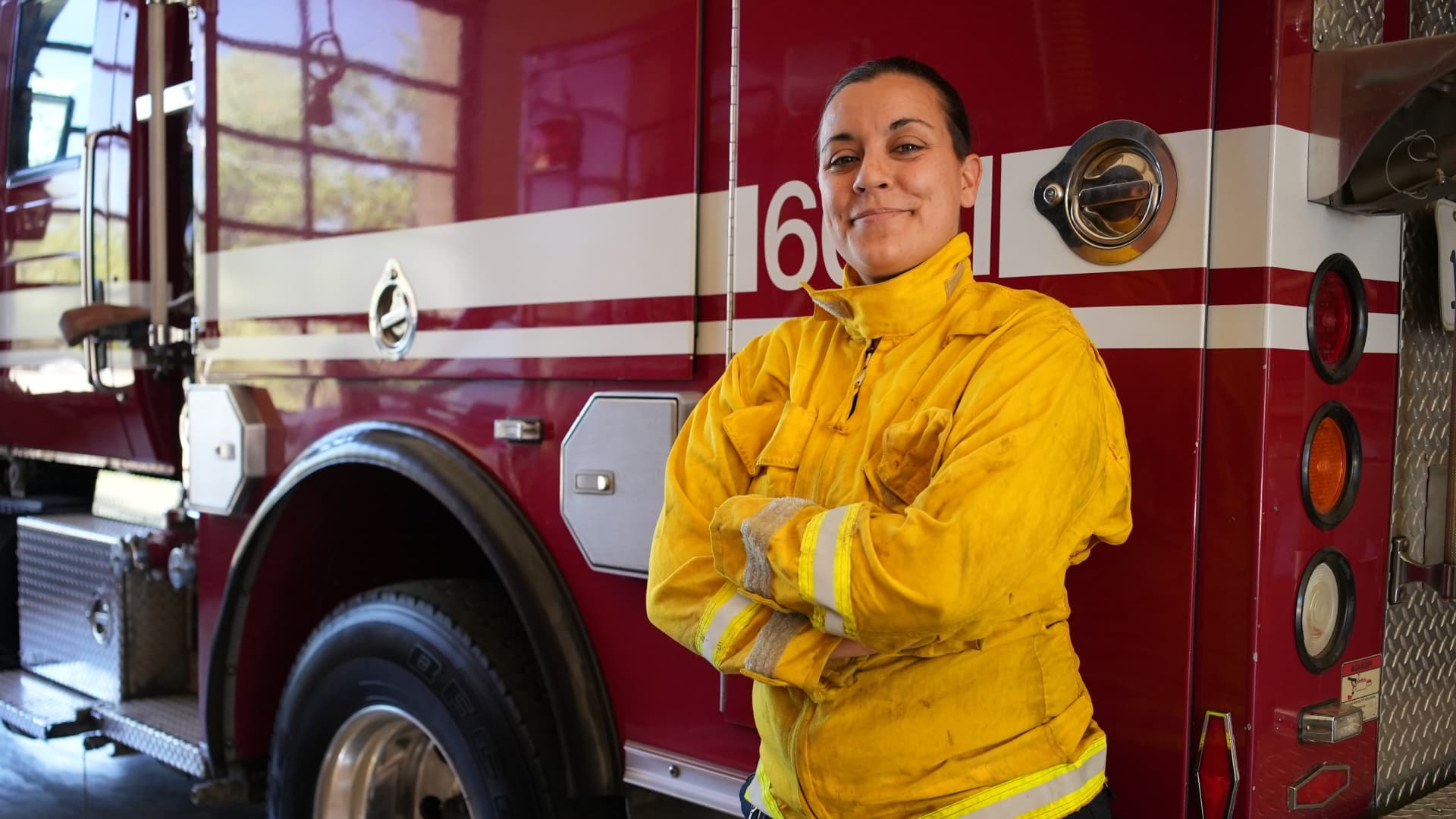
Nico Smith didn’t want to merely make a living, but to “have a living.” She wanted to feel alive.
That desire prompted her to quit her $116,000 a year job as a lawyer in February 2020 to strike out on her own. She ended up starting her own law firm, and later discovered a passion for firefighting.
“A lot of things in my life were in flux at the time,” the 36-year-old California resident tells CNBC Make It. Her ex-wife had just moved to Portland, Oregon, and they had recently adopted a son together as well. Working at a law firm “was just not suiting my lifestyle anymore.”
It came down to her mental health. “Working as a lawyer, you spend a lot of time sitting in a chair, and I have bees in my knees. I like to move around,” Smith says. “I was gaining a lot of weight. I wasn’t happy in my body anymore. I needed to find something that would allow me to have more balance in my life.”
Now, Smith is bringing in around $11,000 a year as a part-time firefighter, and approximately $43,000 as a lawyer. And she’s much happier.
Finding firefighting
After quitting her job at the law firm, Smith had to find a way to support both herself and her son. Luckily, she had a steady support system in her family and was able to move in with her parents.
“My folks really helped out,” she says. “They have a house here … out in the woods, and I was able to support myself because I had my parents’ place. I was really lucky.”
Nico Smith standing in front of a fire truck.
Derek Knowles for CNBC
Smith also had around $10,000 in savings. At the time, “there weren’t a lot of external expenses that were weighing on me. It was just really basic, the bare essentials that I had to work with,” she says.
In May 2020, Smith decided to start her own law firm. “I needed something to do,” she says. “We needed some way of having some income and to keep going.”
However, she was not making much from her own firm. She says she could make more if she pursued it full-time, but with child care hard to come by during the pandemic, she only worked part-time. In 2021, Smith brought in $43,000 from law work.
Then, in August 2020, Smith was introduced to what life as a firefighter might be like.
Lightning struck the hillside of her parents’ property, resulting in a small fire. A group of local firefighters responded and started to hike up the hill to put out the fire, but Smith and her mom knew about a road that led directly to where it was. They followed the group up the hill and pointed them in the direction of the road.
Smith had always been interested in firefighting and decided to ask the captain how to become a volunteer firefighter. The captain explained that the area doesn’t have any volunteer firefighters — but they do have paid call firefighters, who earn hourly wages for the calls they go on. Smith wanted in.
After applying to become a firefighter, going through interviews and passing a drug test and background check, Smith finally attended the fire academy. She graduated in May 2021 and now works part-time as a paid call firefighter, earning $15 an hour.
Living on less
While she may not be making anywhere near $116,000, Smith is far from unhappy. “It’s invigorating,” she says. “It’s exciting. The people are amazing, and you get to be outside. I really like all those things and I really like helping people.”
Smith currently works about 10 to 15 hours a week at the firehouse between training and going on calls. She still works part-time as a lawyer as well, where she clocks in about another 15 hours a week. Between the two, this “mashes together [into] a very poorly paid full-time job,” she says.
The drastic income drop is worth it to Smith though. Being a firefighter is “really a matter of what it means to be alive.”
The people are amazing, and you get to be outside. I really like all those things and I really like helping people.
Nico Smith
Firefighter and lawyer
Smith is also in school to become an emergency medical technician (EMT), and is on track to finish training by the end of the year. After that, she plans to become a paramedic, which will put her in a good spot to find a full-time job in a fire station, she says.
Smith says she could earn anywhere from $50,000 to $100,000 with a full-time position. “You can certainly have a sustainable lifestyle as a firefighter paramedic, even though it’s not going to be 120 grand,” she says.
But that’s never been the driving force behind Smith’s career choices. “I don’t think that it’s healthy for humans to do something just for money,” Smith says. “You have to find something that makes you feel like you’re doing something good.”
For her, that’s firefighting.
Sign up now: Get smarter about your money and career with our weekly newsletter




